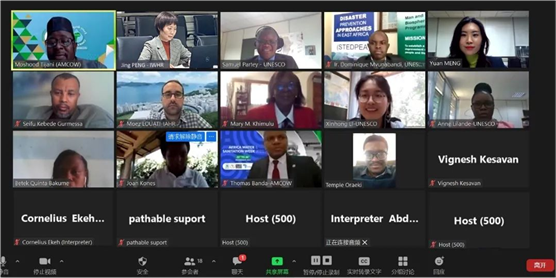The African water and sanitation communities celebrated Africa Water and Sanitation Week 2021--a long-awaited event postponed due to the pandemic--during November 11-26, 2021. Dozens of thematic sessions were organized, rendering refreshing thoughts on addressing the water and sanitation challenges facing the continent.
IWHR, together with UNESCO Nairobi Office, the African Ministers' Council on Water (AMCOW) and the International Association for Hydro-Environment Engineering and Research (IAHR), contributed to this important dialogue process from the perspective of water education. In a thematic session on “Future-proofing the African young generations for water and climate: the educational side” on Nov. 24, representatives from the co-convening organizations, as well as panelists from UNESCO IHP National Committee of Rwanda, University of KwaZulu-Natal, South Africa, Transient Flows Working Group, IAHR and AMCOW Ground Water shed light on why engaging the youth early on their educational path is important and how we can make sure it happens.

Dr. PENG Jing, IWHR Vice President noted that water and climate risks weigh on the young generations disproportionately, as they may not yet have the knowledge, skills and resources to adapt. Therefore, the current generation must live up to their responsibility of educating the young, helping them, and thereby future-proofing the young generation for a changing water and climate scenario.
Dr. Paul Orengoh, AMCOW Programme Officer pointed out that, on the one hand, we must be fully aware of the indispensable role the African youth can play in effective management of water resources and in improving access to water and sanitation. On the other hand, we need to inactivate the sense of responsibility and empowerment of the youth. The Water Education series for school-age children is a prime example of improving water science literacy of the children when they are young enough to change and adapt.
Amparo López Jiménez, IAHR Vice President said that, Africa has a really promising future, and a peer network of knowledgeable and prepared African youth is where this water future of Africa lies. IAHR is ready to work with all parties to catalyze and disseminate knowledge, thoughts and capabilities of the African youth in water engineering, research and policy-making.
Dr. Abou Amani, UNESCO Water Sciences Director and IHP Secretary-General stressed that the youth education on water and environment should ensure that the young women and girls and the vulnerable groups are granted with equal opportunities and an inclusive, enabling environment. In this regard, informal education activities should be promoted on par with formal education so as to realize a continuous education from school through career.”
The IWHR team behind the Water Education English series made a themed presentation on these books, which received generous praises from the panelists. The books are about to reach African schools in 2022.
(Source: IWHR)

